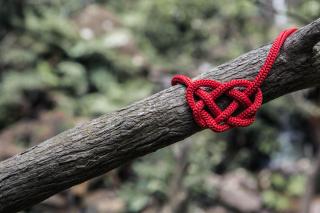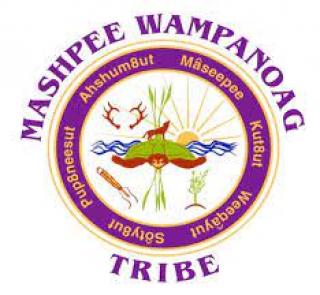*Binding to Tradition
By Meck Groot
While the New England Region staff team’s introduction of the concept and practices of Spiritual Leadership has been enthusiastically received, there’s been some pushback about the one we call “binding to tradition.” Most Unitarian Universalists don’t like the idea of being bound to anything. This one might not make the list of Spiritual Leadership practices for people in other traditions, but Unitarian Universalists tend to ignore or disavow the claim the tradition has on them.

Our use of the word bind for this practice is based in “religare,” the root of the word religion which means to “fasten, bind fast.” Unitarian Universalism comes out of a freedom-seeking tradition. The idea that UUs are bound or would bind themselves to anything feels abhorrent to many. Freedom is one of the faith’s greatest values. The desire for a “free faith” brought the Pilgrims to Turtle Island 400 years ago this fall. So great was their desire for freedom that they committed the capital offense of treason when they separated themselves from the Church of England, the state religion. As descendants of Pilgrims and Puritans, UU congregations are rooted in the tradition of separatists, dissidents, Protest-ants and “lovers of leaving.” It is in UU congregations’ cultural DNA to herald freedom and autonomy.
Binding to tradition is to acknowledge we are not the first ones here. For good and ill, we are all inheritors. In binding to tradition we are not saying, “I allow myself to be chained, oppressed, tyrannized.” It is to recognize we are part of a chain—by birth, adoption or choice. We have ancestors and a legacy. Our ancestors are to be reckoned with—whoever they were and whatever they did. If they delivered gifts to the world, it is on us to continue delivering those gifts in our time. And if our ancestors delivered harm to the world, we must not disown them but interrupt the harm they caused, seek healing and make restitution.
Every year is a good one for the practice of binding to tradition, but this time invites it most particularly. The call for reckoning and reparation from all around invites a renewed congregational commitment to examining and addressing how we got here. Not only does this month mark the 400th anniversary of The Mayflower’s departure from England, it also marks the 250th anniversary of Universalism in this country.
According to UUA records, our oldest congregation, First Parish in Plymouth Massachusetts, was organized in 1620. At the time, it was neither Unitarian nor Universalist but made up of Calvinist separatists who came as refugees and colonists. A decade later came waves of Puritan colonists bent on reforming the Church of England.First Congregational Society in Salem Unitarian was formed in 1629, even before theWinthrop Fleet left England with many hundreds of Puritans coming to colonize Mass Bay. Tens of thousands more Puritan colonists arrived soon after.
TheDescendants of the Mayflower—who trace their lineage to one of 22 men—currently number 10 million in the U.S. alone. Meanwhile, the Wampagnoag whose land the Pilgrims appropriated, currently number between four and five thousand.The Mayflower II, repaired for the quadricentenary at a cost of $11.2M, currently rests in Plymouth Harbor receiving tourists.

The Mashpee Wampanoag Tribe, also known as the People of the First Light
Meanwhile, the remaining portion of land entrusted to the Mashpee Wampanoag is threatened to be removed from trust by the Department of the Interior. While anniversaries are often cause for celebration, this year Unitarian Universalists are called to “mourn, not celebrate the 400 year anniversary of the Mayflower’s arrival in 1620,” toquote* Roxanne Dunbar Ortiz from this year’s General Assembly. For Unitarian Universalist congregations, that mourning will be most genuine and most liberatory for everyone—including our congregations—if it comes with a commitment to learn about how Unitarian and Universalist congregations have participated in histories of harm and to work to repair that harm. As Nina Lytton of First Parish in Cambridge says in another offering* from this year’s General Assembly:
It is time to learn…really learn what you don’t know about our own history … it is time to start the long journey toward truth, repair and reconciliation with those harmed. At the First Parish in Cambridge … we are on the journey.
The practice of binding to tradition is messy and complicated work. Addressing the harms of the past is part of the work. For those wondering where to begin, take up the Cambridge congregation’s invitation to learn more about their journey. Sign the petition to protect the ancestral homelands of the Mashpee Wamanoag. Take up the practice of “Indigenous Land or Territorial Acknowledgement” in your congregation because every congregation in this country gathers on ancestral land. And congregations, families and individuals, can find ways to mark “holidays” such as Indigenous Peoples’ Day and Thanksgiving that respect the call for mourning rather than celebration.
At the same time, our congregations have also received important ancestral gifts that have survived generations. We are responsible for bringing those gifts into the future.One way to do that this year is to mark the sestercentennial of Universalism in this country by attending Murray Grove’s online celebration called “Love Without Exceptions.”Consider how the good news of universal salvation that John Murray preached on Sunday morning, September 30, 1770, offers liberation even as the trauma of historic wounds and daily new injustices continue.
There are ancestral harms to repair and ancestral gifts to deliver. There is no telling what a deep practice of binding to tradition as individuals, as congregations and as an Association makes possible in this generation or those that follow.
*These links connect to materials from the 2020 General Assembly and are accessible to registrants only. Look out for publicized GA workshops and materials in the near future.
Subscribe to receive our blog posts directly to your email!
Subscribe to receive our blog posts directly to your email!
* We have recently changed the name of this practice to Tending Our Tradition, in recognition that the metaphor of binding may have a charge that is harmful for Black people, people of Asian descent, and others.